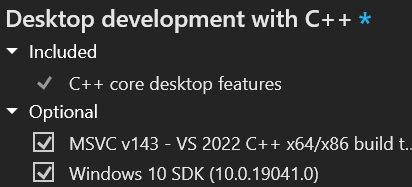This repository contains:
- Workflows for building a Rust fork esp-rs/rust with Xtensa support
- Binary artifacts in Releases
- An installation script to locally install a pre-compiled nightly ESP32 toolchain
- rust-build
Download installer from Release section: [https://github.com/esp-rs/rust-build/releases/tag/v1.62.1.0]
curl -LO https://github.com/esp-rs/rust-build/releases/download/v1.62.1.0/install-rust-toolchain.sh
chmod a+x install-rust-toolchain.shInvoke-WebRequest 'https://github.com/esp-rs/rust-build/releases/download/v1.62.1.0/Install-RustToolchain.ps1' -OutFile .\Install-RustToolchain.ps1The following instructions are specific for the ESP32 and ESP32-S series based on Xtensa architecture.
Instructions for ESP-C series based on RISC-V architecture are described in RISC-V section.
- Linux:
- Dependencies (command for Ubuntu/Debian):
apt-get install -y git curl gcc clang ninja-build cmake libudev-dev unzip xz-utils\ python3 python3-pip python3-venv libusb-1.0-0 libssl-dev pkg-config libtinfo5 libpython2.7
- Dependencies (command for Ubuntu/Debian):
No prerequisites are needed for macOS.
git clone https://github.com/esp-rs/rust-build.git
cd rust-build
./install-rust-toolchain.shRun ./install-rust-toolchain.sh --help for more information about arguments.
Export variables are displayed at the end of the script.
Note If the export variables are added to the shell startup script, the shell may need to be refreshed.
Installation of different version of the toolchain:
./install-rust-toolchain.sh --toolchain-version 1.62.1.0 --export-file export-esp-rust.sh
source export-esp-rust.sh
-b|--build-target: Comma separated list of targets [esp32,esp32s2,esp32s3,esp32c3,all]. Defaults to:esp32,esp32s2,esp32s3-c|--cargo-home: Cargo path.-d|--toolchain-destination: Toolchain instalation folder. Defaults to:<rustup_home>/toolchains/esp-e|--extra-crates: Extra crates to install. Defaults to:ldproxy cargo-espflash-f|--export-file: Destination of the export file generated.-i|--installation-mode: Installation mode: [install, reinstall, uninstall]. Defaults to:install-l|--llvm-version: LLVM version.-m|--minified-esp-idf: [Only applies if using-s|--esp-idf-version]. Deletes some idf folders to save space. Possible values [YES, NO]-n|--nightly-version: Nightly Rust toolchain version. Defaults to:nightly-r|--rustup-home: Path to .rustup. Defaults to:~/.rustup-s|--esp-idf-version: ESP-IDF branch to install. When empty, no esp-idf is installed. Default:""-t|--toolchain-version: Xtensa Rust toolchain version-x|--clear-cache: Removes cached distribution files. Possible values: [YES, NO]
The following instructions describe deployment with the GNU toolchain. If you're using Visual Studio with Windows 10 SDK, consider option Windows x86_64 MSVC.
Install MinGW x86_64 e.g., from releases https://github.com/niXman/mingw-builds-binaries/releases and add bin to environment variable PATH
choco install 7zip
Invoke-WebRequest https://github.com/niXman/mingw-builds-binaries/releases/download/12.1.0-rt_v10-rev3/x86_64-12.1.0-release-posix-seh-rt_v10-rev3.7z -OutFile x86_64-12.1.0-release-posix-seh-rt_v10-rev3.7z
7z e x86_64-12.1.0-release-posix-seh-rt_v10-rev3.7z
$env:PATH+=";.....\x86_64-12.1.0-release-posix-seh-rt_v10-rev3\mingw64\bin"Install ESP-IDF using Windows installer https://dl.espressif.com/dl/esp-idf/
Activate ESP-IDF PowerShell and enter following command:
git clone https://github.com/esp-rs/rust-build.git
cd rust-build
./Install-RustToolchain.ps1 -DefaultHost x86_64-pc-windows-gnu -ExportFile Export-EspRust.ps1
source Export-EspRust.ps1The following instructions are specific for the ESP32 and ESP32-S series based on Xtensa architecture. If you do not have Visual Studio and Windows 10 SDK installed, consider the alternative option Windows x86_64 GNU.
Instructions for ESP-C series based on RISC-V architecture are described in RISC-V section.
- Visual Studio - installed with option Desktop development with C++ - components: MSVCv142 - VS2019 C++ x86/64 build tools, Windows 10 SDK
Installation of prerequisites with Chocolatey (run PowerShell as Administrator):
Set-ExecutionPolicy Bypass -Scope Process -Force; [System.Net.ServicePointManager]::SecurityProtocol = [System.Net.ServicePointManager]::SecurityProtocol -bor 3072; iex ((New-Object System.Net.WebClient).DownloadString('https://community.chocolatey.org/install.ps1'))
choco install cmake git ninja visualstudio2022-workload-vctools windows-sdk-10.0 -ygit clone https://github.com/esp-rs/rust-build.git
cd rust-build
./Install-RustToolchain.ps1Export variables are displayed at the end of the output from the script.
Installation of different versions of toolchain:
./Install-RustToolchain.ps1 -ToolchainVersion 1.62.1.0 -ExportFile Export-EspRust.ps1
source ./Export-EspRust.ps1The following instructions are specific for ESP32-C based on RISC-V architecture.
Install the RISC-V target for Rust:
rustup target add riscv32imc-unknown-none-elf-
Get example source code
git clone https://github.com/ivmarkov/rust-esp32-std-demo.git cd rust-esp32-std-demo/ -
Build and flash:
cargo espflash --target <TARGET> <SERIAL>
Where
TARGETcan be:xtensa-esp32-espidffor the ESP32(Xtensa architecture). [Default]xtensa-esp32s2-espidffor the ESP32-S2(Xtensa architecture).xtensa-esp32s3-espidffor the ESP32-S3(Xtensa architecture).riscv32imc-esp-espidffor the ESP32-C3(RISC-V architecture).
And
SERIALis the serial port connected to the target device.cargo-espflash also allows opening a serial monitor after flashing with
--monitoroption, see Usage section for more information about arguments.
When building for Xtensa targets, we need to override the esp toolchain, there are several solutions:
- Set esp toolchain as default: rustup default esp
- Use cargo +esp
- Override the project directory: rustup override set esp
- Create a file called rust-toolchain.toml or rust-toolchain with:
toml [toolchain] channel = "esp"
-
Get example source code
git clone https://github.com/espressif/rust-esp32-example.git cd rust-esp32-example-main -
Select architecture for the build
idf.py set-target <TARGET>
Where
TARGETcan be:esp32for the ESP32(Xtensa architecture). [Default]esp32s2for the ESP32-S2(Xtensa architecture).esp32s3for the ESP32-S3(Xtensa architecture).
-
Build and flash
idf.py build flash
Alternatively, some container images with pre-installed Rust and ESP-IDF, are published to Dockerhub and can be used to build Rust projects for ESP boards:
- idf-rust
- Some tags contain only the toolchain. The naming convention for those tags is:
<xtensa-version> - Some tags contain full environment with esp-idf installed, wokwi-server
and web-flash to use them
in Dev Containers. This tags are generated for
linux/arm64andlinux/amd64, and use the following naming convention:<board>_<esp-idf>_<xtensa-version> - idf-rust-examples - includes two examples: rust-esp32-example and rust-esp32-std-demo.
Podman example with mapping multiple /dev/ttyUSB from host computer to the container:
podman run --device /dev/ttyUSB0 --device /dev/ttyUSB1 -it docker.io/espressif/idf-rust-examplesDocker (does not support flashing from a container):
docker run -it espressif/idf-rust-examplesIf you are using the idf-rust-examples image, instructions will be displayed on the screen.
Dev Container support is offered for VS Code, Gitpod, and GitHub Codespaces, resulting in a fully working environment to develop for ESP boards in Rust, flash and simulate projects with Wokwi from the container.
Template projects esp-template and esp-idf-template include a question for Dev Containers support.
